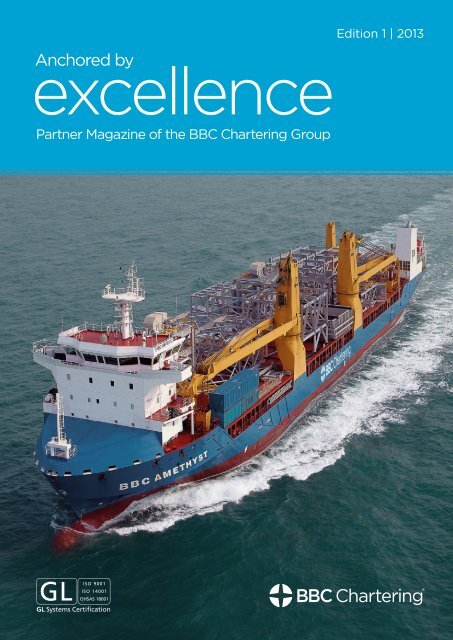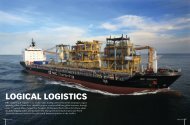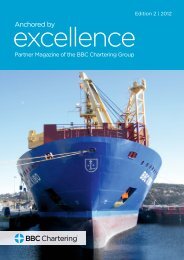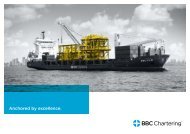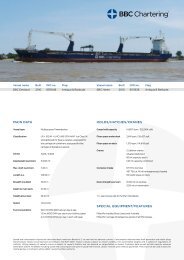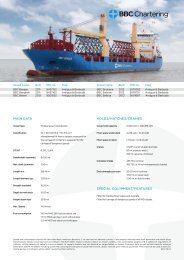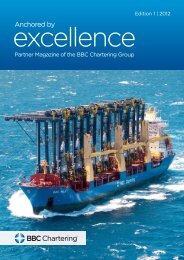Excellence, 7th Edition - BBC Chartering
Excellence, 7th Edition - BBC Chartering
Excellence, 7th Edition - BBC Chartering
Create successful ePaper yourself
Turn your PDF publications into a flip-book with our unique Google optimized e-Paper software.
Dear readersIt’s great to be back with our new excellence magazinein 2013. It’s my personal pleasure to present you this excellencewith lots of inspiring stories from <strong>BBC</strong> <strong>Chartering</strong>.Sometimes we have to make choices and in this issue ourCEO Svend Andersen highlights what <strong>BBC</strong> <strong>Chartering</strong> hasaccomplished in the past year and how this aligns with ourfuture strategy.As we will be at the Intermodal tradeshow in Sao Paulo thisApril, we highlight some South America topics. We will bepresent at the Transrussia in Moscow as well and take thisas an opportunity to talk about our Russian service. And asthe Breakbulk exhibition in Antwerp is coming in May againwe wanted to have a closer look at our European Short SeaServices, too.globally connected community. Content is not only sharedvia analogue means (e.g. printed matters or telephoneconversations) but also digitally. Everything travels fasterthan ever and we can reach wide audiences through this inno time. Today I am proud that this ‘excellence’ issue hasa combined on- and offline distribution of some 25.000copies globally! This is a great success, and we are pleasedby the reputation of ‘excellence’ and the difference thispublication makes. This we owe to you, and we would liketo thank you for sharing the ‘excellence spirit’ in our globalshipping community.As the <strong>BBC</strong> <strong>Chartering</strong> purpose is to raise performancelevels in shipping, ‘excellence’s’ purpose is to talk aboutthe simplest strategy ever: satisfied customers!As our last issue showcased some <strong>BBC</strong> <strong>Chartering</strong> activityin the offshore, oil and gas sector we have not specificallymentioned the contributions that are made by masters andcrews onboard our vessels. We all know they are crucialand we know that coordinating between office and vesselis often a challenge, but we are more than happy whengood cooperation delivers positive client feedback as youcan see inside this issue and as this was the case of clientMcDermott.Today the world is changing quickly, and this is driven alsoby the way information travels in a technically savvy andI kindly wish you may get inspired by this issue proposingyou may be ‘driven by excellence’.Very warm regards,Raymond Fisch‘excellence’ editorImprintResponsible for content:Svend AndersenRaymond FischContact and editing:Raymond FischRaymond.Fisch@bbc-chartering.comSuggestions to:excellence@bbc-chartering.comPublished by:<strong>BBC</strong> <strong>Chartering</strong> & Logistic GmbH & Co. KGHafenstr. 10b · 26789 Leer · Germany© <strong>BBC</strong> <strong>Chartering</strong> 2013 - All rights reservedpurpose. conviction. quality attitude. | page 3
Dear business partnersand friendsWe hope you had a successful start in 2013 so far. It isa pleasure again presenting you this first excellence issuein 2013.Our ‘world in motion’ continues to grow together and withthat our challenges are becoming more global, however,our mission stays the same: offering you highest levelsof performance on your shipping project, for any cargo,at any port on any service. I like to take the opportunityof the first ‘excellence’ in 2013 to quickly highlight a fewinteresting facts about our business as this might give youa better understanding of what you can expect from us inthe future.As partners to a global community we continue to upgradeour fleet for you and finish our recent new-buildingprograms by taking delivery of all remaining heavy-liftvessels this year. Also we are proud to have just completedtwo other vessel programs (<strong>BBC</strong> Congo type this Januaryand <strong>BBC</strong> Bergen type last year) which added to our vesselportfolio enable us to offer you an even younger andmore economic MPV/HL fleet. Also we continue to growour business by matching our fleet portfolio with marketdemands to ensure we continue to become your partnerof choice in the future.Improving market access on a global scale continues tobe a major theme for us this year as well. Easy access tofleet and services of <strong>BBC</strong> <strong>Chartering</strong> will bring leadingshipping solutions to you in any corner of the world. Herewe look forward to provide you the local service youneed to manage and execute your transport efficientlyand safe, adhering to highest quality standards.Our global network of professionals continues to be awareand alert as always for any business opportunity andprepares for this on a continuous basis. As the past hasshown, we invite you to consider <strong>BBC</strong> <strong>Chartering</strong> as theplace where innovative shipping solutions are developedand executed for any shipping request, no matter if this ison tramp, liner or contract services.‘Energy’ continues to be the driving theme for manyshipping projects and demand is driven by offshore, oiland gas, mining and infrastructure projects worldwide.Those sectors are busier than ever executing importantassignments especially in emerging economies. <strong>BBC</strong><strong>Chartering</strong> is pleased to support these projects on a globalscale as we continue to provide tailor made solutions forour clients in any field directly or indirectly involved insuch programs.page 4 | excellence
» At <strong>BBC</strong> <strong>Chartering</strong> shipping is our passion,and excellence is the fuel on our trip. «We look forward to tackling industry challenges thisyear which we believe will give us plenty of excitingnew opportunities – upcoming international events areimportant occasions for us to meet you and talk with youabout how we can help to deliver your project within timeand budget.As everyone knows, the shipping industry is about torecover from recent economic troubles, and many shipowners, operators and carriers had and have to take ablow in the ongoing aftermath of the crisis. This impactsand changes the competitive landscape and forcesmarket participants to adapt to new situations albeit oftenin a ‘struggle for existence’. As a consequence we need toquestion existing patterns of thinking and behavior todaymore than ever, but at the same time we also like to giveyou confidence in our performance when we becomeyour partner of choice. Our quest of delivering and raisingperformance levels is never ending and continues to driveus in this difficult economic environment.At <strong>BBC</strong> <strong>Chartering</strong> shipping is our passion, and excellenceis the fuel on our trip. I like to personally thank you forstaying connected with us in 2013 where I hope we havethe chance to work together on many new projects. Butnow, please enjoy this ‘excellence’ issue which I hope willbe both, entertaining and inspiring for you, deliveringsome stories from the world of project shipping, the worldof <strong>BBC</strong> <strong>Chartering</strong>.We hope to see you soon and catch up with you personallyat one of our upcoming events, Intermodal in Sao Paulothis April, the Transrussia in Moscow or in Antwerp in Maythis year for the ‘Breakbulk Europe’.Hope to see you soon, no matter where!Yours sincerely,Svend AndersenChief Executive Officerpurpose. conviction. quality attitude. | page 5
SouthAmericadrivingthe gameOn investments, investorsand helpersForeign Direct Investments into South AmericaFDI stands for ‘Foreign Direct Investment ’ and representsthe amount of money attracted by a country or regionthat is not funded nationally but internationally. Lookingat foreign direct investments can tell us a lot about aneconomy and its attractiveness as a potential market.South America is a global driver of foreign investmentsand the purpose of this article is to highlight some of thedynamics the region faces.According to the United Nations Conference on Tradeand Development (www.unctad.org) World InvestmentReport, FDI flows to Latin America and the Caribbeanincreased by 16% to a record $217 billion in 2011, drivenmainly by increasing inflows to South America (up 34%).The inflows to Central America and the Caribbeanexcluding offshore financial centers increased by 4%while those to the offshore financial centers registered a4% decrease.The high growth of FDI in South America was mainly dueto its expanding consumer markets, high growth rates andnatural-resource endowment. In 2011 Brazil remained byfar the largest FDI target, with inflows increasing by 37%to $67 billion – 55% of the total in South America and31% of the total in the region. The size of Brazil’s domesticmarket explains its attractiveness, as does its strategicposition in South America, which brings within easyreach other emerging and fast-growing markets, such asArgentina, Chile, Colombia and Peru.Another important driver for FDI growth to South Americahas been the relatively high rate of return on investmentsin the region. Since 2003, South American countries havewitnessed significant growth of income on FDI: from anannual average of $11 billion during 1994–2002, equivalentto 0.84% of the subregion’s GDP, to an annual average of$60 billion during 2003–2011, equivalent to 2.44% of GDP.In 2011, FDI income increased another 17%, reaching $95billion.The rise in FDI income during the 2000s, in parallel withthe increase in FDI stock (a nine-fold increase between1994 and 2011) and share in GDP (from 11 to 28% share incurrent GDP), was in part driven by increased investmentin extractive industries, which have enjoyed high profitabilityand have attracted a significant part of FDI inflowssince the commodity price boom.The rates of return on inward FDI in the extractive industryin Argentina and Chile were about 20% in 2010 and 30%page 6 | excellence
in 2011, while those on all inward FDI were about 11% in2010 and 14% in 2011. The importance of FDI income isevident in the high share of reinvested earnings, which represented45% of FDI flows to South American countriesother than Brazil in 2003–2011, compared with only 11% in1994–2002. Although high and rapidly growing FDI profitsboost investment in productive capacity in host countries,they also entail risks, where cash flows are available forrepatriation or for short-term investment in local markets.Where has the investment into Brazil come from?According to a 2011 study provided by Ernst & Young, theUS continued to be the largest investor in Brazil in termsof projects (up 43% to 149%), value (US$12.4 billion) andjobs created (35,195). This is largely explained by thegeographic proximity and the development of tradeagreements between the two countries. Historically USinvestors have primarily targeted the ICT, manufacturing,business services and financial services sectors in Brazil.The UK jumped from being the fifth largest investor inBrazil in 2010 to second in 2011 by project numbers with45 and the total value of UK investment was nearly on apar with the US at US$ 12.2 billion. Although UK companieshave been present in Brazil for many years, they are nowlooking to expand their investment across a wider arrayof sectors including business services, manufacturing,mining, metals, and ICT. Spain was the third largestinvestor in Brazil with Germany fourth in terms of projectsnumbers. Although the value of German investmentspurpose. conviction. quality attitude. | page 7
emains low at US$3.0 billion this is likely to increase inthe near future given the involvement German companieshave with the infrastructure upgrades for the World Cupand the Rio 2016 Games. Both Germany and Japan, whichranks fifth and increased its FDI projects by 57% in 2011,are also beginning to invest heavily in the energy sector.China has emerged as the fifth largest investor in Brazil interms of value of FDI with investment increasing six-foldsince 2010 and a 70% increase in project numbers. It alsoranks fifth with the number of jobs created at 9,049.The recent boom in the Brazilian consumer markethas also led to an increase in investments by small andmedium-sized Chinese companies in the country‘s manufacturingsector. In the future, Chinese investment isalso expected to be directed at the areas of technology,logistics and infrastructure. The overall momentum acrossall sectors is also expected to increase as a result of a jointcommuniqué signed in 2011 to promote cooperation intrade and investment. As Jorge Menegassi, CEO, SouthAmerica and Brazil at Ernst & Young explains, “Brazil isan attractive investment destination (…) thanks to its vastnatural resources in oil, gas and minerals.”the Middle East and a service from the Mediterraneanis available. Depending on the connection, the carrier’sservice frequencies vary from one to four sailings permonth.Svend Andersen is proud that South America follows itspath and states, “The future holds its challenges but weare confident that the hosting of the soccer World Cup in2014 and the Rio 2016 Games will more than contributeto the ongoing success and development of Latamand Brazil. It may help to attract significant additionalinvestments into the country which will in turn require theworld to work together to get things done. In this respect,<strong>BBC</strong> <strong>Chartering</strong> considers itself a proud partner to SouthAmerica: in the past, today and in the future.”A proud partner and helperSome of the largest projects in the world are underway inSouth America. <strong>BBC</strong> <strong>Chartering</strong> is ‘indirectly’ involved inmost of them and continues to be an important pillar forthe logistics of these projects. <strong>BBC</strong> <strong>Chartering</strong> vessels havebeen involved in delivering components and equipmentfor the many mining ventures for Iron ore, Copper, Nickel,Coal, Gold, Uranium and Lithium in Argentina, Brazil,Bolivia, Chile, Colombia, and Peru. Also the energy sectorrequires heavy lift and multipurpose tonnage from <strong>BBC</strong><strong>Chartering</strong> which can handle mission critical energyand power equipment and components. Moreover thetransport and infrastructure industry requires partnersthat can reliably deliver logistic equipment (e.g. harborcranes or rail cars) to South America.Today <strong>BBC</strong> <strong>Chartering</strong> covers South America with oneof the most extensive liner networks for project cargoesin the world. For the past 12 years the carrier not onlybrought important equipment and machinery to SouthAmerica, <strong>BBC</strong> vessels are also helping the continent’sexport industry to stay competitive.Due to the unique force of the <strong>BBC</strong> <strong>Chartering</strong> network,there are plenty of options for shippers to make use ofattractive market opportunities on a <strong>BBC</strong> <strong>Chartering</strong>service.With established regular services <strong>BBC</strong> covers both coasts,first with the Americana Line in the East, and second withthe Andino Express Line in the West. Embedded in a globalnetwork, there is a North American Service, a EuropeanService and a Far East Service. Also a regular service topage 8 | excellence
purpose. conviction. quality attitude. | page 9
Projectshippingin ‘Latam’Challenges and opportunitiesfor further growthpage 10 | excellence
<strong>BBC</strong> <strong>Chartering</strong> holds a strong footprint in LatinAmerica (Latam) due to an early focus on serving thecontinent’s logistical needs. Being there for over 12years the first regular liner connections to West coastand East Coast destinations were introduced back in2005. Since then <strong>BBC</strong> <strong>Chartering</strong> has expanded uponits position and today offers an important network ofshipping services for project cargoes in South America.Almost one fifth of <strong>BBC</strong> <strong>Chartering</strong>’s current globalstaff works in South America, in offices located in Brazil,Argentina, Chile, Peru, Colombia and Ecuador.Today Brazil Intermodal 2013 stages South America’smost important sector event and brings together majorplayers in the logistics industry, cargo transportationand foreign trade. The show plays a major role also in<strong>BBC</strong> <strong>Chartering</strong>’s event calendar and we like to take thisopportunity to talk to Washington de Barros and NatalieJones, <strong>BBC</strong> <strong>Chartering</strong>’s ‘Latam’ project cargo veteransand local spearheads about current industry trends andhow they believe <strong>BBC</strong> <strong>Chartering</strong> can create value in theemerging economies of South America and Brazil in thefuture.How has the economic crisis impacted business inSouth America? How has the market been faring therein the past few years?Washington de Barros (WdB): The economy of Brazil,as a whole, stayed behind expectations in 2012. I thinkthat the growth rate of ‘only’ 2.7 % in 2012 is a result of areduced volume of goods manufactured by the industry,smaller profits and subsequently a cut in investmentsthat would normally extend the country’s productioncapacity.Also for South America as a whole, expectation for 2013are moderate after a growth of 4.5% in 2012, the overallprojection for the continent is only 2.7% according toUN’s global outlook.Also the devaluation of the Real currency comparedto the US Dollar caused Brazil to lose the 6th placeamong the largest economies in the world, and wenow rank again behind England.purpose. conviction. quality attitude. | page 11
What were specific draw-backs in Brazil and whatshould be improved?WdB: The oil and gas sector got hit worst. Tenders toexplore deposits were suspended back in 2008 becauseof changes in legislation. As a consequence,projects were delayed significantly, some even indefinite.An example is the Comperj-Petrochemicalcomplex in Rio de Janeiro. The complex should havebeen operational already in 2011, but its first refineryshall not be ready before 2015.Spanish companies e.g. Isolux Corsán, Acciona andCopasa are very active. The project portfolio of thesecompanies include four lots of Rodoanel Trecho Nortede Sao Paulo, the power transmission line betweenMacapá and Manaus, the BRs 116 and 324, Line 4 ofthe São Paulo Subway and the breakwaters of the Açusuperport.Certainly this list will increase with the new tenderson highways, railways, ports and airports, which werelaunched in the second half of last year.We hope the government will undertake further measuresproviding frame parameters for sustainablegrowth. With that we should be able to reinforceconfidence and trust in Brazil’s economy and underlineits growth ability attracting further foreign investments.How do you see growth prospects in the future andhow would they impact breakbulk shipping?Natalie Jones (NJ): We think the projections for Brazil’seconomy are more positive for 2013 and consecutiveyears. The progress seems a result of the infrastructureworks for the world’s two largest sporting events:the World Cup 2014 and the Olympics 2016. Largeprojects require the handling of all types of breakbulkcargoes for the construction and maintenance of roads,improvements in public transport, ports, airports,stadiums and arenas for these events.How is <strong>BBC</strong> <strong>Chartering</strong> perceived in South America?NJ: <strong>BBC</strong> <strong>Chartering</strong> has expanded significantly since itsbeginning in South America and continues to believein the market. We feel the market becomes more andmore aware of our efforts, our fleet quality and the levelof performance that we can deliver.<strong>BBC</strong> <strong>Chartering</strong> currently has about 13-18 vessels aloneat the Brazilian coast per month. Besides enjoyingpremier connections for project imports, this givesBrazilian shippers many opportunities to move exportcargo to any port in the world. Our experience is thatclients are excited about <strong>BBC</strong> <strong>Chartering</strong> when they hearabout us. Still there is a large share of the market that isnot educated about our service offerings. Building ourbrand, increasing awareness of our possibilities is anongoing job and there is much to do.To what extent are foreign construction companies involvedin that?In your opinion, what are further challenges that needto be tackled to foster growth in Brazil?WdB: We see many European companies taking majorshares of the pie here. They already have contractsexceeding R$ 10 billion and there is appetite for more.WdB: We feel that current port infrastructure is one ofthe biggest obstacles to the expansion of the maritimeindustry in the country and the continent. Productivity ofWashington de Barrospage 12 | excellence
Brazilian ports limits the potential of the shipping sectorand shows huge catch-up potential. This also representsan obstacle to the growth of exports and imports. Inreality we face extremely congested terminals andsurrounding areas.Moreover, the lack of sufficient intermodal road andrail-connections hinder the transportation of cargoesfrom their origin to ports and vice-versa. This increasestime-losses, operating cost, and slows supply chainsand growth of services. Unfortunately, this often mayderail the shipper’s choice of selecting less economicroad transportation over maritime transport through amisperceived door-to-door differential.Are there any services of special interest that youwould like to highlight for the East Coast of SouthAmerica?as an emerging market. Today it is still one of our mostimportant strategic growth markets.Our network of liner connections to and from SouthAmerica is subject to constant changes. Adapting tomore demand for our services prompting us to increasecapacity on the WCSA trade is good news to share.We are proud to be the only carrier that can offer thisweekly service.The same goes for the service we offer throughCaytrans<strong>BBC</strong> (a joint venture service we have with Dan-Gulf Shipping): seeing the demand there, we wantedto offer the market regular sailings to Venezuela andTrinidad as well.How do your client’s needs differ in South America tothe rest of the world?NJ: We have introduced a Mediterranean-Brazil route,operating regularly in ports of Turkey (Izmir) and Italy(Genoa and Marghera). Here we have two ships permonth. In addition, new export contracts for the PersianGulf were signed which now allow us to serve thisroute directly every two to three months. In general welook for business to increase the number of contractsrequiring regular shipments where <strong>BBC</strong> <strong>Chartering</strong> hasa competitive advantage.Regarding the capacity increase on your WCSA Servicefrom Houston – would you care to expand uponthis? Similarly, what was the reasoning behind your recentCaribbean expansion?WdB: South America has always been an importantmarket for us. We were one of the first shipping companiesthat saw the tremendous potential of ‘Latam’NJ: Responding to differentiating client needs iscertainly a strength of <strong>BBC</strong> <strong>Chartering</strong>. We think onone hand it is about technical aspects, planning, safeexecution and flexibility regarding the project delivery,and on the other hand it is about a direct personal relationwith a client.Each interaction and transaction is different and westrive to maintain both a productive working relationshipsand a solution oriented attitude on any project.With that we can resolve most issues and createmutually beneficial outcomes on any assignment.Our goal is to make it work with them and for them as itis our mission is to raise performance standards in theindustry. This is what our clients appreciate around theworld.Natalie Jonespurpose. conviction. quality attitude. | page 13
page 18 | excellence
Values create value -excellence deliverspurpose. conviction. quality attitude. | page 19
A glimpsebehindthe pearlsTwo ships, two pearls - two namesYou may have seen in our last excellence issue acenterfold picture where the ‘<strong>BBC</strong> Pearl’ was transportingthe ‘Black Pearl’. We thought this was aninteresting coincidence and take this as an opportunityto come up with this unique essay honoring the twofloating devices.Did you know that the ‘Black Pearl’ was originally called‘Wicked Wench’? According to the fiction, the ship wasregistered to the East India Trading Co. and owned byCutler Beckett, the EITC Director for West Africa.Jack Sparrow captained the ‘Wicked Wench’ for CutlerBeckett for about a year, hauling various cargoes, buthe refused to haul slaves. Hoping to recruit Sparrow asone of his many ‘operatives’, he had dispatched Sparrowon a mission to find the lost island of Kerma in order toperk up a treasure trove there. But Sparrow followed hisown agenda, double-crossed his employer and claimedhe couldn‘t locate the island.Suspicious that Sparrow had indeed found both theisland and the treasure, but had not informed him,Beckett determined to browbeat the captain intoobedience, demanded that the young captain transporta cargo of slaves to the New World. Initially Sparrowagreed, but when he realized that he was betrayingthe ‘Wicked Wench’, as well as himself, he rebelledand freed the slaves by taking them to Kerma for safeasylum.Furious that Sparrow had flouted his orders and stolenfrom him, Beckett had Sparrow thrown into jail. Afterallowing him to languish for a couple of months, he hadhim transported to the ‘Wicked Wench‘s’ anchorage,about a mile from the coast of West Africa, near Calabaron the Bight of Benin. There, after personally brandingSparrow with the ‘P’ brand (so he‘d be forever brandeda pirate) Cutler Beckett gave the order to abandonhis own ship, the ‘Wicked Wench’, in order to totallydemoralize his prisoner.Sparrow attempted to rescue his burning, founderingship, but he was too late. The ‘Wicked Wench’ turnedinto an inferno; she sank and took Jack with her.But, while dying, Sparrow called upon Davy Jones, acharacter in charge of ferrying souls who died at seato the ‘other side’, and struck a bargain with him: hissoul and one hundred years serving aboard the ‘FlyingDutchman’ in return for a continued human existenceof thirteen years as captain, plus saving the ‘WickedWench’ and transforming her into the fastest, mostpage 16 | excellence
dangerous pirate ship sailing the seven seas. Jackchristened his resurrected ‘Wench’, now a black vesselwith an angel figurehead, ‘The Black Pearl’.It will be difficult to come up with a similar story for the‘<strong>BBC</strong> Pearl’. However there is a commonality as ‘<strong>BBC</strong>Pearl’ is the second branded name of this vessel whichalso runs under the name ‘North Sea Carrier’ for herowners. As exciting adventures today, she is employedto face the logistical challenges of a globalized worldand carries project and heavy-lift cargo and occasionallystory-loaded cargo, such as the ‘Black Pearl’.It’s not due to our lack of creativity that we confidentlywish that above story should be avoided and that allparties involved, i.e. captain, crew, owner and last <strong>BBC</strong><strong>Chartering</strong> as operators have good reason to worktogether…. working for our clients, raising performancelevels in our industry.purpose. conviction. quality attitude. | page 17
Mission accomplished‘<strong>BBC</strong> Congo’ series fully deployed – rejuvenation ongoing<strong>BBC</strong> <strong>Chartering</strong> has one of the most recognizedheavy lift fleet modernization programs in the projectshipping industry underway. As part of this the companyannounces the completion of a vessel program which isknown as the ‘<strong>BBC</strong> Congo’ series.<strong>Chartering</strong>. Like her six sister vessels she is a 17,000dwtvessel and features 2x 250mt and 1x 80mt lifting capacity.This vessel can be seen as a modernized heavy liftsuccessor of the popular 17,500dwt ‘<strong>BBC</strong> Ems’ typeseries which only featured 3x 80mt cranes.It was this January when the last and seventh memberof this program the ‘<strong>BBC</strong> Danube’ left the shipyard inXingang, China and commenced her service for <strong>BBC</strong>The <strong>BBC</strong> Congo is a multipurpose vessel with conventionaldesign. The 143.14m long vessel has a bulbousbow, a wheelhouse in the aft and an open water typepage 18 | excellence
stern, single rudder and a single fixed propeller drivenby a slow speed diesel engine. The vessel’s cargo holdshave been constructed with a double skin, a doublebottom strengthened for heavy cargoes (up to 20mt/m²)and side tanks. The cargo hold area is divided into twoparts by a vertical HFO tank arrangement contributing tothe torsional strength of the 22.8m wide hull. Cargo hold#1 is 35.00m long and has a minimum beam of 13,21m anda maximum beam of 18,60m. Cargo hold #2 is 52,50mlong and 18,60m wide. Both holds are box shaped anddesigned to carry tween-deck hatch covers but are alsolaid out for the carriage of containers. The vessel is fittedfor the carriage of dangerous goods of all IMO classes.As reported earlier <strong>BBC</strong> <strong>Chartering</strong> is also engaged in twoother new building heavy lift fleet programs. The programsunder way are first the 14 unit counting 14,360dwt ‘<strong>BBC</strong>Amber’ series, featuring 2x 400mt lifting capacity, andsecond, the eight unit counting 9,300dwt ‘<strong>BBC</strong> Everest’type with 2x 350mt lifting gear. Both programs are expectedto be completed in the course of 2013.So far this year, <strong>BBC</strong> <strong>Chartering</strong> took delivery of the ‘<strong>BBC</strong>Moonstone’ this January, the ninth new-building of the 14unit series, and last December of the ‘<strong>BBC</strong> Vesuvius’, theseventh new-building of the 9,300dwt series. Meanwhilesixteen of 22 vessels are operational and <strong>BBC</strong> <strong>Chartering</strong>’sCEO Svend Andersen states, ‘We are proud of our fleetand the new vessels. With them we raise the bar in acompetitive industry where we help our clients with anunrivaled level of performance and tailor-made MPV / HLshipping solutions worldwide.’purpose. conviction. quality attitude. | page 19
Raising the barOur crew makes the differenceIn July 2011 oilfield services firm McDermott InternationalInc. won the subsea contract for deepwateroffshore engineering, construction and installation on theMacedon project. The SURF (Subsea, Umbilical, Riser andFlowlines) contract is McDermott‘s first SURF project inAustralia. The work scope includes detailed engineering,procurement, fabrication, transportation and installationof a 48-mile-long (77-kilometer-long), 20-inch-diameterpipeline, as well as the installation of subsea umbilicalsand flexible flowlines in waters measuring up to 591 feet(180 meters) deep.As we reported earlier, <strong>BBC</strong> <strong>Chartering</strong> was contractedto support the logistics and coordinate all aspects ofthis unique assignment through it`s project division. Theshore based team was aware of the fact, that loadingand transporting cables of that magnitude requiresmuch attention to detail, a high level of commitmentand a quality attitude. And realizing such a projectsuccessfully also needed good collaboration and opencommunication not only with the client, but also withvessel and crew.For the <strong>BBC</strong> <strong>Chartering</strong> office team it was an excitingexperience to work on this project that also representeda ‘first of its kind’ for <strong>BBC</strong> <strong>Chartering</strong>. The team wasasked to deliver a ‘turnkey project’ coordinating allworks throughout the process of planning, engineering,manufacturing, and executing the transport.The project team started with calculating and planningthe required sea-fastening elements ensuring their designwas sufficient and worked the first time. Delivering thejob however is crucial and managing the interaction ofclient, crew and suppliers during loading and unloadingoperations represent ‘the moments of truth’ for anyproject. In this case operations had to be managed overvarious locations in Europe and as stated before, the‘<strong>BBC</strong> Nordland’ was discharged in Batam (Indonesia)page 20 | excellence
Crew of <strong>BBC</strong> Nordlandwhere the umbilical was spooled over a triple bankingoperation onto McDermott’s ‘North Ocean 102’, a DP2construction support vessel.The <strong>BBC</strong> <strong>Chartering</strong> team reports it enjoyed an excellentdirect working relationship with the crew onboardthe ‘<strong>BBC</strong> Nordland’ who did an exceptional job. Alsowith zero incident reported this mission was highlysuccessful. For the same project, in a different lot, them/v Dollart was the selected standby vessel involved invarious supply missions to McDermott’s DP2 cable layvessel ‘North Ocean 105’. For both vessels, the client waspleased with the crew’s performance and the generalhandling of the project.We are proud of all accomplishments made throughoutthis project and we would like to say thank you for anexcep-tional project delivery and engagement to Capt.Sergey Tregubov and Capt. Sergei Mikhaylov and theircrew on the <strong>BBC</strong> Nordland. Although the M/V Dollarthas left the fleet, we extend our thanks to Capt. IgorTretyakov and Capt. Yury Gordienko and their crewfor executing the offshore supply mission in the Bay ofExmouth.We look forward to seeing much more of such exemplaryco-operation in the future, both on land and on boardour vessels and hope to prove over and over again: Thebest strategy is a satisfied customer!purpose. conviction. quality attitude. | page 21
EuropeanShort SeaServicesBringing heavy lift capacityto a regional marketClearly there are a few considerations when gearedproject carriers are employed for short distances and thevalue needs to be visible for clients if the decision is infavor of such a solution.The reasons that normally speak against the employmentof such vessels on local trades, especially in the NorthSea and Baltic are their higher charter rates compared tosmaller coaster tonnage and barge transports which arewidely available there.The higher rates for geared vessels seem justified asthese are more investment intense than their un-gearedcompetitors plus they often need to be mobilized fromtheir global trades to North European waters. Thequestion rather is: What for? Especially if offering sucha service for a single client would not work, as utilizationof the vessel may not be sufficient either. Normallythe operator may decide to leave such vessels in theirrespective international trades.page 22 | excellence
Hence, deciding to position a vessel is a risk, but also anopportunity. Theoretically there is enough business togo for – but practically marketing the service’s valueto the relevant customers becomes the crucial task toget the business and make it really work. <strong>BBC</strong> <strong>Chartering</strong>has made the call and meanwhile employed already afew geared vessels in regional trades in North Europeanwaters. So the market is there and the innovation wasworth pursuing for <strong>BBC</strong> so far.Mainly driven by the oil and gas industry but also bythe offshore wind business there is activity of specialistfabrication yards in the Scandinavian countries andconsolidation at the northern coast of the Europeancontinent. Next to shipping, handling, and storing oftensuitable lifting equipment is required to manage logisticsof oversized yard output. The niche comes throughthe equipment and hence the value which geared <strong>BBC</strong><strong>Chartering</strong> vessels can create in total cost comparison toclients.As one of the most prominent examples <strong>BBC</strong> <strong>Chartering</strong>supplied the <strong>BBC</strong> Germany to deliver transition pieces ona contract basis from Bremen to Cuxhaven – a 100 miledistance, a perfect match in the logistic strategy for theproject’s heavy supplies. Other cargoes were contractedin between and mainly aim at helping clients consolidatetheir cargo for further international dispatch.Jens Meilvang, Chief <strong>Chartering</strong> Officer of <strong>BBC</strong> <strong>Chartering</strong>explains the value behind the European shortsea service in this way: ‘At <strong>BBC</strong> <strong>Chartering</strong> we supportour clients with vessels that are suited to access portswith low draft characteristics and yet offer the abilityto handle very heavy and oversized cargo. Otheradvantages we bring to the table are our capabilities torespond to clients HSEQ requirements and also to delivertransport engineering if this is required.’ Mr. Meilvangadds, ‘The global network of <strong>BBC</strong> <strong>Chartering</strong> makesthings work, irrespective of the shipping challenge! Forinstance helping to consolidate the cargo for clients andthen helping again to ship consolidated cargo to otherinternational destinations is a unique value our clientsappreciate having through one supplier.’<strong>Excellence</strong> in shipping means to ‘move and improve’also in creating market opportunities for regional andinterfacing shipping solutions. We like to congratulateon this successful service design and the deliveredvalue to our customers. We can conclude that a criticalassessment of any short sea solutions and interfacinginternational logistics can mean no harm – but it may addsignificant value if you talk to <strong>BBC</strong> <strong>Chartering</strong>.purpose. conviction. quality attitude. | page 23
<strong>BBC</strong> <strong>Chartering</strong> Russian ServiceDelivering crucial logistics to central RussiaPraxair, Inc. is the largest industrial gases companyin North and South America, and one of the largestworldwide, with sales totaling $11 billion in 2012. Thecompany produces, sells and distributes atmosphericand process gases, and high-performance surfacecoatings.It was back in 2011 when Praxair Rus, a subsidiary ofPraxair, won a contract to supply oxygen, nitrogen andargon to NTMK, a division of the EVRAZ Group, a leadingglobal steel company with its main steel productionfacilities in Russia. 3,000 tons per day of industrial gasesneed to be delivered to NTMK in Nizhniy Tagil, locatedin the centre of the industrial region of Sverdlovsk incentral Russia. For this Praxair had to build new, energyefficientair separation plants. Managing its logistics forpage 24 | excellence
the project Praxair contracted Agility Logistic, a globalleader in integrated logistics.The plants are scheduled to start production this yearand aim to replace older air separation plants. Togetherwith the LOGIS Group, <strong>BBC</strong> <strong>Chartering</strong> was contractedby Agility for the shipment of two complete sets of airseparation units and other plant components providingintegrated marine logistics for this important project in2012. <strong>BBC</strong> <strong>Chartering</strong> was in charge of the ocean searivertransport and the barging share of the transportwas managed by LOGIS.The project comprised the shipping of over 20,000 frtincluding 21 pieces of heavy lift cargo. A large share ofthis shipment was delivered on board the <strong>BBC</strong> Summeron her maiden voyage from Shanghai to Mariupol.In Mariupol the cargo was trans-shipped onto fourRussian sea-river vessels that then took the cargo toNizhnekamsk (heavy lift cargo) and to Perm (generalcargo) for discharge.The heavy lift cargoes shipped to Nizhnekamsk wereloaded onto two ro-ro river barges. These two ro-robarges made five voyages to VerkhnechusovskiyGorodki (Chusovaya river) where they were dischargedover ro-ro ramps. Following their unloading, the heavylift items got rolled of the barges and were trucked totheir final destination, Nishniy Tagil by the client.Next to the cargo of the <strong>BBC</strong> Summer in Mariupol,a second shipment of about 6,000 frt needed to beloaded in Antwerp onboard two Russian sea-rivervessels. Routed via Gibraltar these vessels were goingto Rostov-on-Don in the Azov Sea first for customclearance. From there they progressed for unloading inNizhnekamsk and Perm.Before the cargoes were delivered at their finaldestinations, the whole logistic execution took more thantwo months starting with the arrival of <strong>BBC</strong> Summer inMariupol. This included 33 days for barging and ro-rooperations and it was finished ‘just-in-time’ on October27, 2012, 3 days before the Kama River got closed fornavigation in the winter.<strong>BBC</strong> <strong>Chartering</strong>’s office in St. Petersburg was instrumentalin performing this project and with thatdemonstrated the carrier’s execution capabilities andadministrative expertise on its Russian service. Aftersuccessful completion of the project the client expressedhis satisfaction about a job well done, thanking for ‘anexcellent performance over all stages of the project.’Also <strong>BBC</strong> <strong>Chartering</strong>’s local spearhead in St. Petersburg,Sergey Timofeev stated ‘We are proud we could help torealize this project with our ‘<strong>BBC</strong> Russian Services’ andlike to thank all partners involved for their trust and thedelivered performance.’From its roots in emerging markets, Agility bringsefficiency to supply chains in some of the globe’s mostchallenging environments, personal service, a globalfootprint and customized capabilities in developedcountries and emerging economies alike. As publiclytraded company, Agility is one of the world’s leadingproviders of integrated logistics with close to $6 billion inannual revenue and more than 22,000 employees in 550offices across 100 countries.Agility‘s commercial business, Global IntegratedLogistics (GIL), is headquartered in Switzerland. AgilityGIL provides supply chain solutions to meet complexand traditional customer needs. GIL offers air, sea androad freight forwarding, warehousing, distribution andspecialized services in project logistics, fairs and events,fuels and chemicals.Agility‘s unique collection of portfolio businesses includesAgility Defense & Government Services, a logisticsprovider to governments, ministries of defense andinternational organizations. Agility‘s Infrastructure groupof companies manages commercial and industrial realestate and offers solutions in customs optimization andclearance, waste management and recycling, aviationservices, remote infrastructure and life support.www.agilitylogistics.compurpose. conviction. quality attitude. | page 25
More capacity onCaribbean serviceCaytrans <strong>BBC</strong> adds ‘<strong>BBC</strong> Ocean’ to regional fleetDan-Gulf Shipping announced that the m/v <strong>BBC</strong> Oceanjoined the Caytrans<strong>BBC</strong> fleet in February this year. The<strong>BBC</strong> Ocean is a 6,150dwt tween deck multipurpose vesselwith 329,450cbf bale capacity featuring 120mt liftingcapacity. The <strong>BBC</strong> Ocean is now operated by Caytrans<strong>BBC</strong>which offers a weekly break-bulk liner service betweenHouston and Mobile to the North Coast of South America,the Caribbean and Central America. The larger vessel andthe increased capacity allow the line to provide higherlevels of service to clients.‘Adding a larger vessel to our fleet reflects our positiveoutlook on the market and is a direct result of the continuedgrowth of our service. We believe that the <strong>BBC</strong> Ocean willallow us to offer better options for larger parcels into andout of the North Coast of South America’ said Mac Bruton,Vice President for Sales and Marketing at Dan-Gulf.Caytrans <strong>BBC</strong> LLC is a joint venture between <strong>BBC</strong><strong>Chartering</strong> & Logistics GmbH & Co. KG and CaytransProject Services (Americas) Ltd. The Caytrans<strong>BBC</strong> Serviceis managed by Dan-Gulf Shipping. With sales jointlyhandled by <strong>BBC</strong> <strong>Chartering</strong> USA and Dan-Gulf, the servicehas enjoyed a steady and healthy growth over the yearsthanks to its customer service, its operating professionalsand its competitive pricing.Caytrans<strong>BBC</strong> operates between five and six box shapedmultipurpose tweendeckers between 3,500 and 6,150dwtwith lifting capacity of up to 120mt. The service has theability to quickly tap into the large fleet of multipurposetweendeckers operated by <strong>BBC</strong> <strong>Chartering</strong>, giving accessto vessels with lifting capacity of up to 800mt.page 26 | excellence
<strong>BBC</strong> Events Q3/2013Extemin, ArequipaStaged every second year, EXTEMIN is a major Peruvianindustry event, representing the leading meeting place forglobal suppliers of the local mining industry. More than 1,000companies are present and over 30,000 professionals areexpected at this event which is again framed by the meetings,talks and conferences of the 31st edition of the PERUMIN MiningConvention.Event dateSep. 16 - 20, 2013LocationCentro de Conventiones Cerro Juli;Arequipa, Peru, Booth# 427/428Breakbulk Americas, New OrleansBreakbulk Americas is the largest and most importantgathering in North America for companies involved in theshipping of heavy-lift, project cargo and traditional breakbulkcargoes. Over 4000 participants and about 280 exhibitorsattended the Breakbulk Americas event in 2012. The audienceconsists of professionals from leading carriers, forwarders,ports, terminals, and packers all of which offer the expertise andresources to handle non-standardized and oversized cargoes.Event dateSep. 24 - 26, 2013LocationErnest N. Morial Convention Center NewOrleans, LA USA, Booth# 701Gallimarkt, LeerThe city of Leer, the second largest German shipping hub,today is a vital supporter of lifeblood to global trade throughits ship owners, its shipping people and the services providedby them worldwide. For the 16th time in a row <strong>BBC</strong> <strong>Chartering</strong>takes the city’s annual Gallimarkt, introduced some 505 yearsago in 1508, as an opportunity to invite business partners toenjoy a unique dinner party with employees in <strong>BBC</strong> <strong>Chartering</strong>’shometown.Event dateOct. 10, 2013Location‘The Shipping Tent’ ad-hoc dining halland ballroom; Leer, Germanypurpose. conviction. quality attitude. | page 25 27
Get connected.


